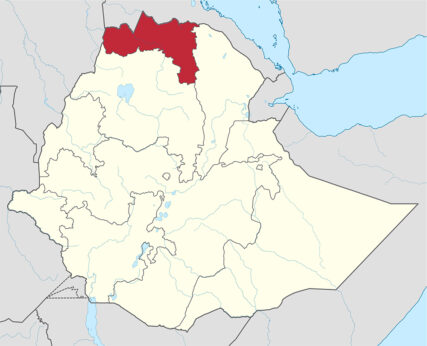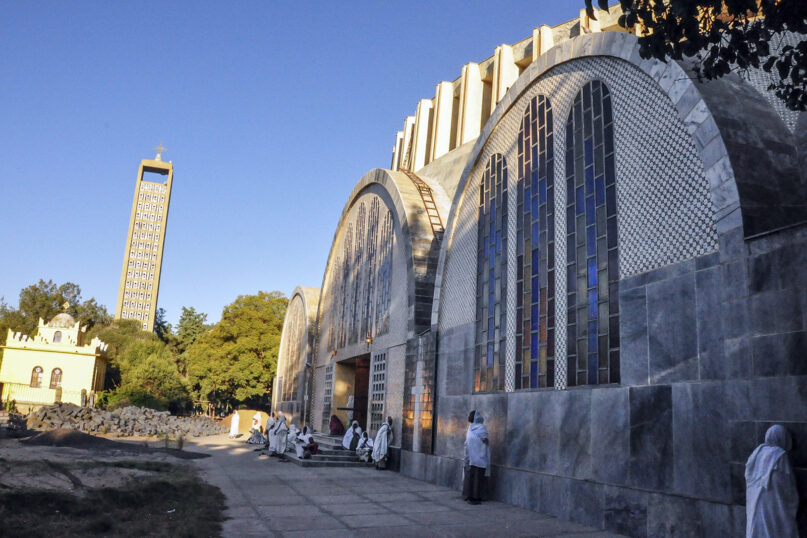NAIROBI, Kenya (RNS) — Fighting in Tigray, a semi-autonomous state in northern Ethiopia, resulted in massacres at ancient religious sites as the country’s military battled the forces of the ruling party in the state, the Tigray People’s Liberation Front.
People seeking shelter were attacked at the Church of Our Lady of Mary of Zion, a 1,600-year-old Ethiopian Tewahedo Orthodox church in the city of Aksum, and purportedly the resting place of the biblical ark of the covenant. About 125 miles east, the Al-Nejashi Mosque, which is said to contain the tombs of 15 of the Prophet Muhammad’s disciples, was also attacked.
The fighting started on Nov. 4, after Ethiopian Prime Minister Abiy Ahmed Ali, an evangelical Christian, ordered strikes against TPLF leaders. Ali announced the end of the operation on Nov. 28.
RELATED: Islamist militants fuel Christian persecution in Kenya, faith leaders say
But reports followed of the alleged killing of at least 750 unarmed people on the grounds of the Church of Our Lady of Mary of Zion in early days of the operation.
“People had fled inside the centers hoping to be saved, but they were slaughtered inside churches,” said a Roman Catholic priest from Tigray who asked that he not be named. “It is an atrocity. While the target may not have been the heritage site, but the people fleeing there, the actions must be denounced in strongest terms possible.”
Ethiopia is 40% Orthodox Christian and 64% Christian overall. Muslims make up 35% of the population, according to Pew-Templeton’s Global Religious Futures Project.

The Tigray region, red, in northern Ethiopia. Map courtesy of Creative Commons
When forces began advancing toward Aksum, hundreds of farmers, villagers and some clerics moved into the church’s compound seeking safety and to protect the ark, fearing that soldiers could steal or take it away.
The Europe External Program with Africa, a Belgium-based organization that seeks Europe’s involvement in human rights, reported that “Hundreds of people hiding in the church were brought out and shot on the front square.”
With internet and telephone services interrupted in the initial days of the conflict, it was difficult to know what was happening in the region. Most accounts of attacks on the historical sites have been from farmers and villagers who fled the area.
Al-Nejashi Mosque in Wukro was attacked in mid-November, according to witness accounts. The mosque, one of the oldest in Africa, and the nearby Amanuel Orthodox Church were shelled, according to reports, and later looted by Ethiopian and Eritrean soldiers.
The tombs of Islamic figures and the mosque’s dome and minaret were damaged. Killings were also reported in the mosque compound and some artifacts stolen.
“We have determined from our sources that a number of innocent people, including a father of four children, were killed by Eritrean soldiers for protesting against the Mosque’s pillaging on 26 November,” Ahmed Siraj, a representative of the International Association of Muslims in Tigray, told Middle East Eye.
Shaykh Hamid Byamugenzi, a Ugandan religious scholar who is a former director of Islamic University in Uganda, said the attacks on places of worship in Tigray could affect relations between the two faiths in Ethiopia.
“We feel that attack on places of worship will create religious strife that can easily spread to other regions,” said Byamugenzi. “The worst is revenge attacks or even trigger of some form of radicalization following the killing and injuring of innocent people.”
The government, which blames the TPLF for the destruction, has promised to repair the destroyed church and the mosque, locally referred to as the second “Mecca.”
A senior official promised to send a technical team to assess the damage at the mosque and the church, but some Ethiopians are skeptical, fearing that there has been an attempt to cover up the destruction of the places of worship.





